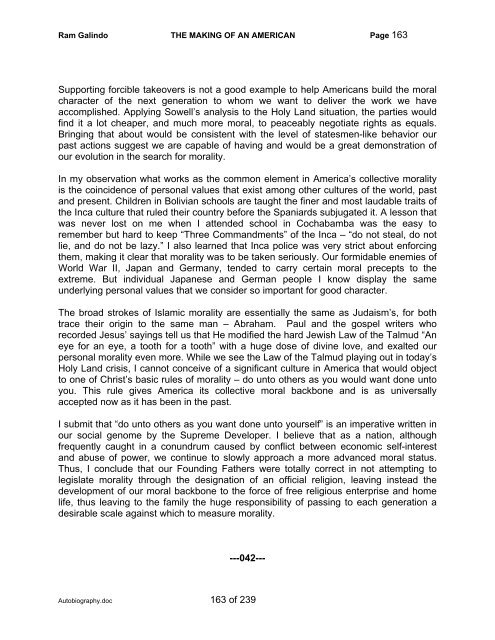Autobiography - The Galindo Group
Autobiography - The Galindo Group
Autobiography - The Galindo Group
Create successful ePaper yourself
Turn your PDF publications into a flip-book with our unique Google optimized e-Paper software.
Ram <strong>Galindo</strong> THE MAKING OF AN AMERICAN Page 163<br />
Supporting forcible takeovers is not a good example to help Americans build the moral<br />
character of the next generation to whom we want to deliver the work we have<br />
accomplished. Applying Sowell’s analysis to the Holy Land situation, the parties would<br />
find it a lot cheaper, and much more moral, to peaceably negotiate rights as equals.<br />
Bringing that about would be consistent with the level of statesmen-like behavior our<br />
past actions suggest we are capable of having and would be a great demonstration of<br />
our evolution in the search for morality.<br />
In my observation what works as the common element in America’s collective morality<br />
is the coincidence of personal values that exist among other cultures of the world, past<br />
and present. Children in Bolivian schools are taught the finer and most laudable traits of<br />
the Inca culture that ruled their country before the Spaniards subjugated it. A lesson that<br />
was never lost on me when I attended school in Cochabamba was the easy to<br />
remember but hard to keep “Three Commandments” of the Inca – “do not steal, do not<br />
lie, and do not be lazy.” I also learned that Inca police was very strict about enforcing<br />
them, making it clear that morality was to be taken seriously. Our formidable enemies of<br />
World War II, Japan and Germany, tended to carry certain moral precepts to the<br />
extreme. But individual Japanese and German people I know display the same<br />
underlying personal values that we consider so important for good character.<br />
<strong>The</strong> broad strokes of Islamic morality are essentially the same as Judaism’s, for both<br />
trace their origin to the same man – Abraham. Paul and the gospel writers who<br />
recorded Jesus’ sayings tell us that He modified the hard Jewish Law of the Talmud “An<br />
eye for an eye, a tooth for a tooth” with a huge dose of divine love, and exalted our<br />
personal morality even more. While we see the Law of the Talmud playing out in today’s<br />
Holy Land crisis, I cannot conceive of a significant culture in America that would object<br />
to one of Christ’s basic rules of morality – do unto others as you would want done unto<br />
you. This rule gives America its collective moral backbone and is as universally<br />
accepted now as it has been in the past.<br />
I submit that “do unto others as you want done unto yourself” is an imperative written in<br />
our social genome by the Supreme Developer. I believe that as a nation, although<br />
frequently caught in a conundrum caused by conflict between economic self-interest<br />
and abuse of power, we continue to slowly approach a more advanced moral status.<br />
Thus, I conclude that our Founding Fathers were totally correct in not attempting to<br />
legislate morality through the designation of an official religion, leaving instead the<br />
development of our moral backbone to the force of free religious enterprise and home<br />
life, thus leaving to the family the huge responsibility of passing to each generation a<br />
desirable scale against which to measure morality.<br />
---042---<br />
<strong>Autobiography</strong>.doc 163 of 239


